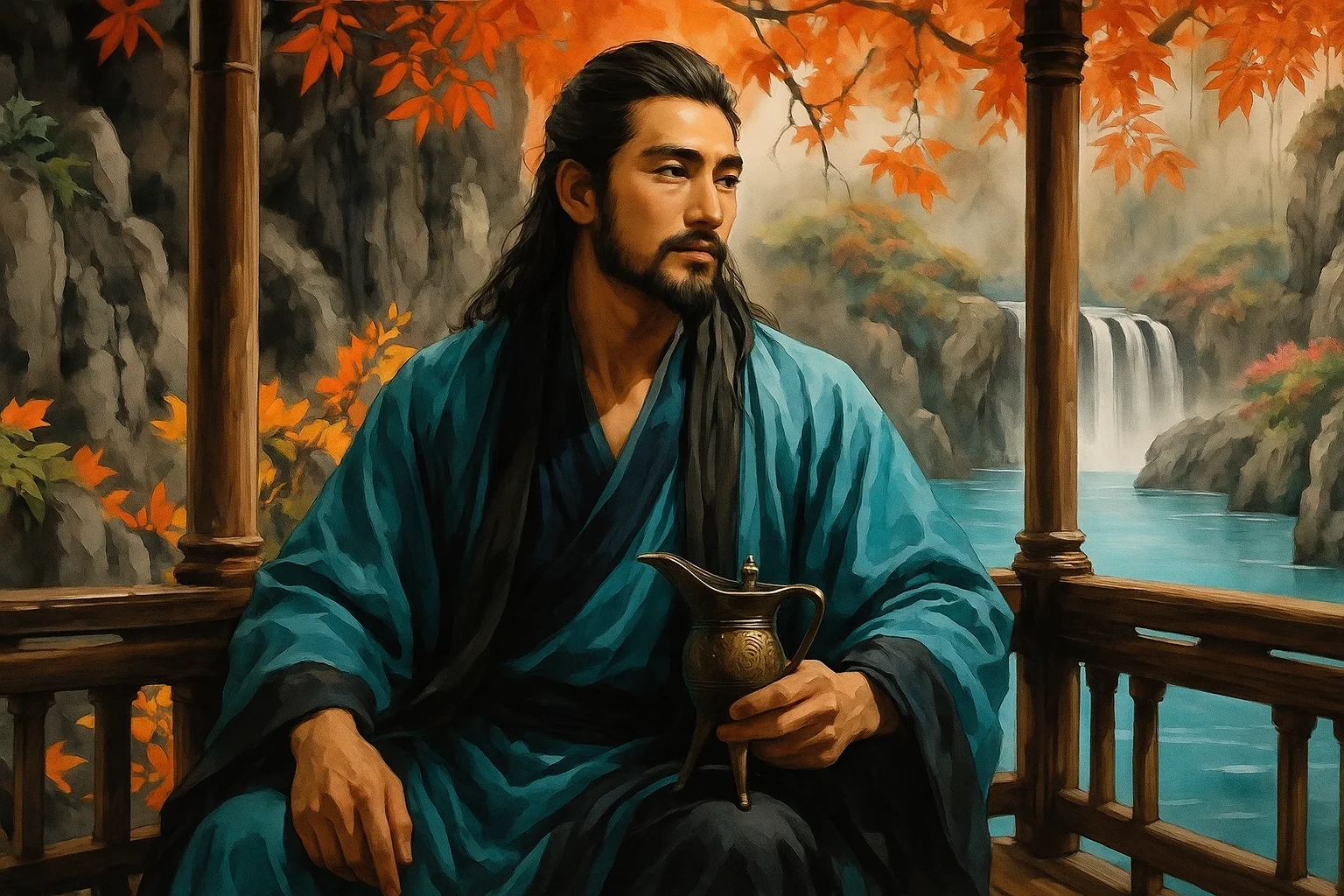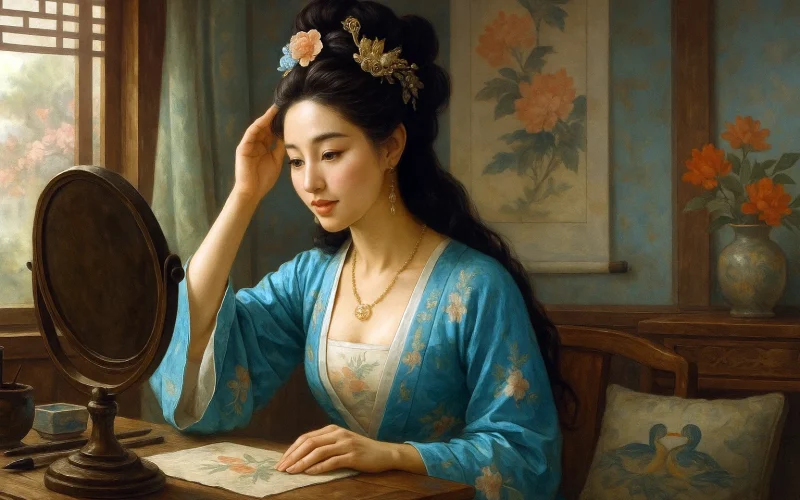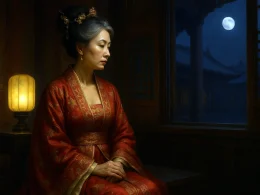Her phoenix-coiled hair with gold-dusted bands,
A dragon-carved jade comb in her hands,
She steps to the window, leaning on him with a smile,
"My love, are my eyebrows drawn in the latest style?"
She clings to him, idly toying with her brush,
First tracing flowers with a maiden's blush.
Her needlework forgotten, she gazes at her spouse,
"Show me," she laughs, "how to write 'a pair of lovebirds'?"
Original Poem
「南歌子 · 凤髻金泥带」
欧阳修
凤髻金泥带,龙纹玉掌梳。
走来窗下笑相扶,爱道画眉深浅入时无?
弄笔偎人久,描花试手初。
等闲妨了绣功夫,笑问鸳鸯两字、怎生书?
Interpretation
Composed during Emperor Renzong's reign when Ouyang Xiu was at the height of his political engagement with the Qingli Reforms, this lyric reflects his literary philosophy of "verse for ideals, prose for doctrine" while showcasing his lighter, more intimate ci style. Capturing playful romantic banter between lovers, it reveals the softer, domestic dimensions of Northern Song scholar-officials' lives, embodying the delicate charm of boudoir poetry with its tender whispers and affectionate teasing.
First Stanza: "凤髻金泥带,龙纹玉掌梳。走来窗下笑相扶,爱道画眉深浅入时无?"
Fèng jì jīn ní dài, lóng wén yù zhǎng shū. Zǒu lái chuāng xià xiào xiāng fú, ài dào huà méi shēn qiǎn rù shí wú?
Phoenix coils bound with golden bands,
Jade comb carved with dragon's trace.
She giggles by the window, clutching his hands,
"Tell me, dear—are my brows in fashion's grace?"
The stanza constructs an exquisite still life of aristocratic adornment—the phoenix hairpin (凤髻) and dragon-comb (龙纹梳) symbolizing yin-yang harmony. The window becomes a theatrical frame where cosmetic inquiry ("brows in fashion") transforms into intimate performance, revealing Song elite couples' sophisticated courtship rituals beyond Confucian formality.
Second Stanza: "弄笔偎人久,描花试手初。等闲妨了绣功夫,笑问鸳鸯两字、怎生书?"
Nòng bǐ wēi rén jiǔ, miáo huā shì shǒu chū. Děng xián fáng le xiù gōng fu, xiào wèn yuān yāng liǎng zì, zěn shēng shū?
Brush twirling, she nestles close,
First strokes tracing floral dreams.
"I've neglected my embroidery—
But show me," laughing she leans,
"How to write 'lovebirds' in your finest hand it seems?"
Here, calligraphy becomes erotic metaphor: the "first strokes" (试手初) of painting parallel romantic initiation, while the deliberate neglect of needlework (绣功夫) subverts traditional feminine virtues. The climactic "lovebirds" (鸳鸯) query—posed as childish ignorance but charged with sexual innuendo—demonstrates Ouyang's mastery of suggestiveness through seemingly innocent domestic scenes.
Holistic Appreciation
This lyric poem exudes an intimate and tender charm, with each line brimming with warmth as it depicts the affectionate interactions and sweet whispers between lovers. Through delicate observation, the poet captures fragments of a woman's daily life—her toilette, painting flowers, embroidery, and playful questions—transforming ordinary details into poetic imagery that creates a cozy, lighthearted, and romantic domestic atmosphere.
This is no grand ode from lofty halls, nor a brooding reflection on political storms, but rather a gentle chamber song—a quintessential example of life's aesthetics in Song dynasty poetry. Here, romantic love is expressed not through bold declarations but through subtle, flowing moments like "the shade of her eyebrows" and "embroidered mandarin ducks," feeling utterly natural and leaving an endless aftertaste.
Artistic Merits
- Everyday Realism & Detailed Sensibility: Combing hair, tracing eyebrows, sketching flowers—these mundane acts vividly portray the woman's beauty and personality.
- Colloquial & Playful Language: Phrases like "she loves to say" and "asks with a laugh" heighten the intimacy, immersing readers in the scene.
- Gentle Emotion, Cozy Ambiance: No clamor or conflict, only soft murmurs and quiet closeness, embodying the classic boudoir lyric style of the Song era.
- Poignant Closure, Lingering Resonance: The "mandarin ducks" motif—whimsical yet symbolic of love—conveys profound affection with the lightest touch.
Insights
This poem reminds us: True love often resides in life's minutiae. Passion need not be thunderous; it shines more genuinely in shared glances and tender banter. With this gentle lyric, Ouyang Xiu paints an ordinary yet blissful portrait of love, urging us to cherish the seemingly trivial companionship and warmth in daily life. In today's fast-paced world, the poem's tranquil harmony—where partners sit side by side in quiet contentment—feels more precious than ever.
Poem Translator
Xu Yuanchong (许渊冲)
About the Poet

Ouyang Xiu (欧阳修, 1007 - 1072), a native of Yongfeng, Jizhou (present-day Jiangxi Province), emerged as the preeminent literary figure of the Northern Song Dynasty. After attaining the jinshi degree in 1030, he spearheaded a literary reform movement that rejected the ornate Xikun style prevalent at court. As a mentor who nurtured literary giants like Su Shi and Zeng Gong, he laid the foundation for the golden age of Northern Song literature. Recognized as one of the "Eight Great Prose Masters of Tang and Song," Ouyang stands as the pivotal figure in the transformation of Northern Song literary culture.












